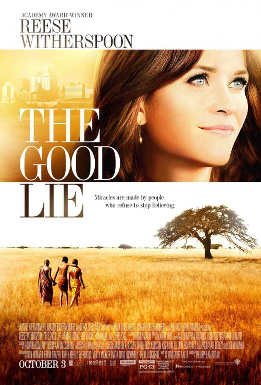At first glance, The Good Lie worried me. Brought to us by the executive producer of The Blind Side, the movie chronicles Sudanese refugees as they move to the United States and face the challenges of building a new life while dealing with the trauma of the war they grew up in. The trailer features a lot of Reese Witherspoon and advertises, "She opened her home"¦they opened her eyes". Basically, I was incredibly worried that these Sudanese refugees would fade into the background, becoming simple props that served to open up Reese Witherspoon's character into a more enlightened and fulfilled individual.
I am happy to report that the trailer is deceiving. Witherspoon's character Carrie is by and far a secondary character to the refugees Mamere, Jeremiah, Paul, and Abidal. These four are the heart of the film. We begin in a small village in South Sudan going about its routine. Unfortunately, all too soon, there are helicopters in the sky and armed, masked men shooting down everyone they see. A small group of children escape as the only survivors. As they walk on foot to try and find refuge in another country, their numbers grow smaller. Finally, with almost 600 miles walked, they make it to a Kenyan refugee camp, where they proceed to get stuck for the next 13 years. When we next see our protagonists, they're young adults who've cobbled together a life at the camp and wait their turn to get sent to the United States. When that day comes, Mamere (Arnold Oceng), Jeremiah (Ger Duany), Paul (Emmanuel Jal), and Abidal (Kuoth Wiel) all get to leave together to the mythical land of Kansas City. That is until they get into JFK Airport to find out that Abidal, the sister in the group, is being placed in Boston. Meanwhile, Mamere, Jeremiah, and Paul continue to Kansas City and meet Carrie (Witherspoon) who is tasked with helping them find jobs. Soon, Carrie is going above and beyond her duties to make sure these "Lost Boys" stay together and succeed.
The Good Lie is inspired by the true story of "The Lost Boys" of Sudan, an entire generation orphaned by the violent civil war in Sudan that began in 1983. Then, in 1998, a humanitarian effort brought 3600 lost boys and girls to America. The Good Lie does an admirable job of showcasing what these children went through but excels at showcasing the irreparable effects the war had on these children. The nexus of the film is the relationship between the refugees. While they are permanently bonded over their shared experiences, that doesn't mean that they're a perfect family with no problems. The brothers fight and disagree about how to live and deal with their past. They are all haunted by their war experiences, and each chooses to process it in a different way. It is this exploration of these relationships that keeps the film from getting too schmaltzy.
That said, there is plenty of schmaltz. While I teared up multiple times while watching the film, it was pretty evenly split between happy tears and sad tears. I was impressed with the performances in this film, particularly after I realized that the actors who play the refugees are refugees or children of refugees themselves. Many of them have gone from such dark childhoods to being able to portray their experiences on the screen to better educate people on the reality of this lost generation, and it lends the film an authenticity that would otherwise be missing.
If you're in the mood for a little schmaltz and inspiration, The Good Lie is a good choice. And even if people buy a ticket for Reese Witherspoon, if they go home and start googling, the misleading trailer will be worth it.

